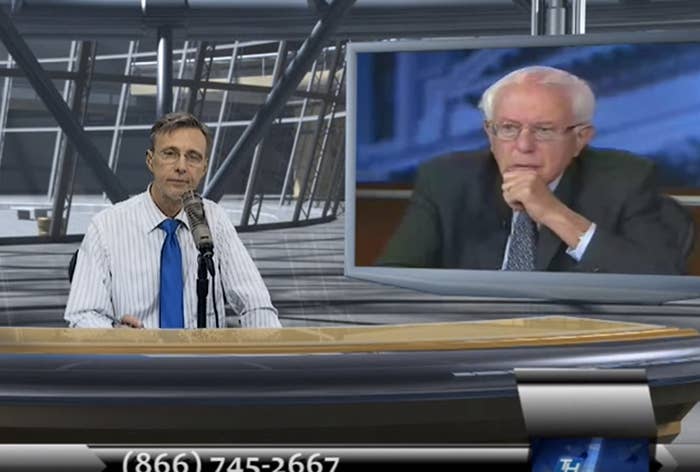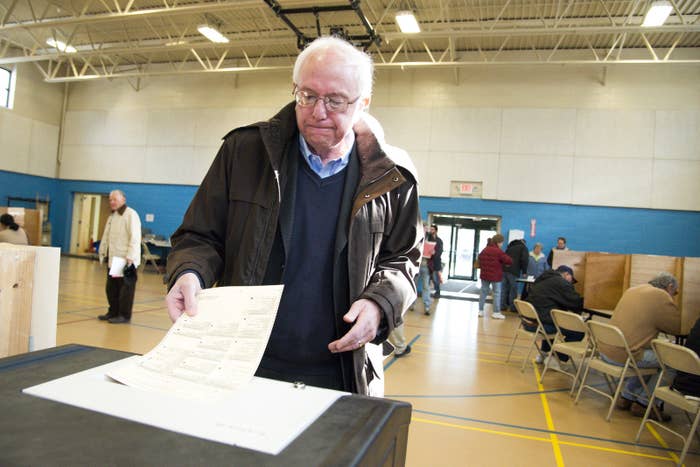
COLUMBIA, South Carolina — In 2008, Bernie Sanders stayed out of the contentious Democratic presidential primary until after the nominee had been chosen. Once Barack Obama became the party’s choice for president, Sanders ventured to a Democratic Party convention for the first time in his political career and called on independents like him to support Obama.
In 2011, Sanders said more than once that a challenge from the left might help President Obama get back on track after, Sanders said, the president had veered far to the right, selling out the left on issues like entitlement programs in the interests of cutting deals with Republican leaders. At one point, he Sanders said he was “giving thought” to encouraging a progressive to run against Obama, telling a radio caller, “I don’t want to tell you more than that, but this is an issue we are beginning to talk about a little bit.”
As he mounts his own bid for the Democratic nomination this year, Sanders is having to thread the needle of his past independence. In South Carolina on Saturday, Sanders rejected the idea that he was less than loyal to Obama in 2012 — something that Martin O’Malley, who is running in a distant third place in the nomination fight, suggested on Friday night and has this year on the trail. (O’Malley has his own problems casting himself as an Obama loyalist; he was among Clinton’s most fervent supporters in 2008.)
Sanders’s response on Saturday was unequivocal: He said he was a strong advocate for Obama’s election and reelection.
“I think contested elections are not a bad thing, but the idea that I worked against President Obama is untrue,” Sanders said at a press conference. “In fact, I vigorously supported him in 2008, he came to my state in 2006. I campaigned for him in 2008, I campaigned for him very hard in 2012, and I never made any effort to enlist a candidate against him.”
Senior officials on Obama’s 2008 and 2012 campaigns did not remember the cycles the same way when it came to Sanders. BuzzFeed News talked to four senior officials from Obama’s campaigns, most of whom are unaligned in the 2016 primary.
Their take on Sanders’ role: In 2008, he got on board with Obama late. In 2012, he was either attacking the president from the left or doing little to get him elected. As for “vigorously” supporting him, they said, Sanders was not someone they thought of as a top surrogate.
“Every indication we had was that he was considering a primary challenge,” said one senior official from Obama’s 2012 campaign.
“Being annoying,” another said when asked to recall how they remembered Sanders in 2012.
A third senior Obama campaign aide from 2012 said Sanders was simply not often top of mind.
“Have no recollection of him being any kind of factor whatsoever, supporter or not,” the aide said in an email to BuzzFeed News.
The Sanders campaign declined to respond to the Obama campaign comments.
“I can't help you on what they remember or don't remember,” a Sanders adviser told BuzzFeed News.

On ABC News Sunday, Sanders called talk of Sanders endorsing an Obama primary challenge “media stuff.” But he spoke more about his past criticisms of the president than he did at the South Carolina press conference.
“The idea that I’ve worked against Barack Obama is categorically false,” he said. “I’ve worked very hard to see Barack Obama elected. He came to Vermont to campaign for me in 2006. I’ve worked for him in 2008. I’ve worked for him in 2012. And listen I think under incredible Republican obstructionism, Obama and Joe Biden have moved this country in a way that leaves a hell of a lot better than we were when Bush left office. Do I have disagreements with Barack Obama? Was I on the floor for 8.5 hours saying, no, we should not be giving any more tax breaks to the wealthy? Do I disagree with him on TPP? Yes, I do.”
“But Barack Obama is a friend of mine,” Sanders went on. “I think he’s been a very strong president and has taken this country extraordinarily difficult moment in history in a very positive way.”
In the wake of the 2010 midterm defeat, and Obama’s pursuing of a so-called “grand bargain” with newly powerful Republicans on a budget, more than one progressive in Washington began to regularly and publicly criticize Obama. Sanders was among them. He was among the most vocal in his criticisms of the White House.
In May 2012, The Hill listed Sanders as one of several “Dem thorns” still in Obama’s side as the reelection campaign spooled up. The paper cited Sanders’s support for the idea of a progressive primary against Obama, which was prevalent in national interviews with Sanders throughout 2011. In November 2011, Politico reported “liberals like Sen. Bernie Sanders are declining to give their unqualified support for the president.”
Sanders said this weekend he was just supporting contested elections, and backing a primary was never a serious idea. But Sanders did use talk of a progressive primary of Obama to send sharp criticisms his way in 2011. And at least once he said, “I am now giving thought to doing it.”
Asked who could primary Obama, Sanders responded this way on CSPAN’s Newsmakers program on Aug. 12, 2011:
I don’t know of anybody in mind, but I’m sure that there are smart people out there who can do it. Here’s the point: If you’re asking me, do I think at the end of the day that Barack Obama is going to be the Democratic nominee for president in 2012? I do. But do I believe that it is a good idea for our democracy, and for the Democratic Party — and I speak, by the way, as an independent — that people start asking the president some hard questions about why he said one thing during his previous campaign and then is doing another thing today on Social Security, on Medicare? I think it is important that that discussion take place.
The C-SPAN interview came after the July 22, 2011 appearance on the Thom Hartmann Program, a progressive talk show where Sanders first made headlines for embracing the idea of a primary opponent for Obama, and saying he was considering encouraging someone to get in.
The Hartmann show pulled the clip at the time and posted it to YouTube under the headline “A Primary Challenger For Obama?”
Sanders was asked multiple questions about a primary opponent for the president.
“Bernie, if you won’t run for president, and I really wish you would consider it, how can we get this country back on track? How can we get a government that calls balls and strikes and quits running the country like a for-profit machine? How do we do it?
Sanders’s response:
Ryan, believe me, I wish I had the answer to your question. Let me just suggest this. I think that there are millions of Americans who are deeply disappointed in the president, who believe that with regard to Social Security and a number of other issues, he has said one thing as a candidate and is doing something very much else, who cannot believe how weak he has been — for whatever reason — in negotiating with Republicans, and there’s deep disappointment. So my suggestion is, I think, you know one of the reasons the president has been able to move so far to the right is that there is no primary opposition to him. And I think it would do this country a good deal of service if people started thinking about candidates out there to begin contrasting what is a progressive agenda as opposed to what Obama is doing.
A second caller asked, “Who out there would you suggest? Who are you talking to? Are you encouraging anyone?”
Sanders said he had not yet reached out, but told the caller to stay tuned.
At this point, I have not, but I am now giving thought to doing it. You know the names out there as well as I do. And I think the American people have got to be engaged, it’s not just me or anybody else here in Washington. There are a lot of smart, honest progressives who I think can be good presidents. One of the reasons President Obama has moved as far to the right as he has, is he thinks he can go all the way and no one will stand up to him. So, Tim, I don’t want to tell you more than that, but this is an issue we are beginning to talk about a little bit.”
Sanders eventually backed Obama in 2012. In March, he and other Vermont leaders spoke before the president at a rally on the University of Vermont campus, where Obama called Sanders and his fellow Vermont Sen. Patrick Leahy, “outstanding.” In his remarks, Sanders credited Obama with saving the country from economic disaster.
“We are going to do everything that we can to reelect Barack Obama as president of the United States,” Sanders told the crowd. “The election this November is of monumental importance.”
Months later, though, Sanders was quick to criticize Obama when things went awry on the campaign trail. After Obama’s disastrous first debate with Mitt Romney in October of 2012, Sanders appeared on CNN and went after the president hard for, he said, failing to draw a stark enough line with his opponent.
"The truth of the matter is, Mitt Romney right now is the head of a right-wing extremist party called the Republican Party," Sanders said. "And if the president cannot differentiate himself clearly from right-wing extremism, we have a lot of problems as a nation and he has a lot of problems as a candidate running for re-election."
The story of Sanders as Obama surrogate is one of an independent who expressed deep respect and support for Obama while also keeping his distance. In 2008, while the Democratic Party was roiled by the primary fight between Obama and Hillary Clinton, Sanders stayed on the sidelines. He told the Burlington Free Press he knew both candidates well, and called them both "moderate to liberal."
"As an independent, I will not endorse a candidate in the Democratic primary, but I will campaign vigorously for Barack Obama or Hillary Clinton after one of them becomes the nominee,” Sanders said in a February 2008 statement.
In August of that year, after Obama sewed up the nomination and Clinton dropped out, Sanders attended his first Democratic Party convention. He told Gannett he was finding common ground with Democrats there.
"We respect each other, and we work together for the common good while maintaining our differences," Sanders said.

